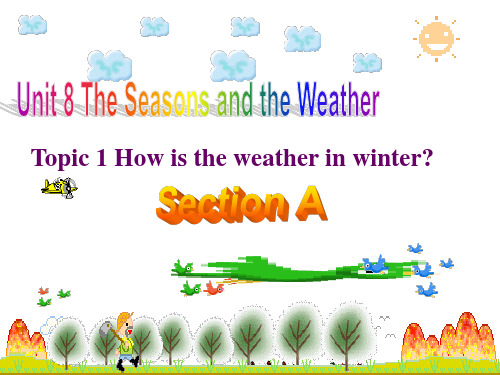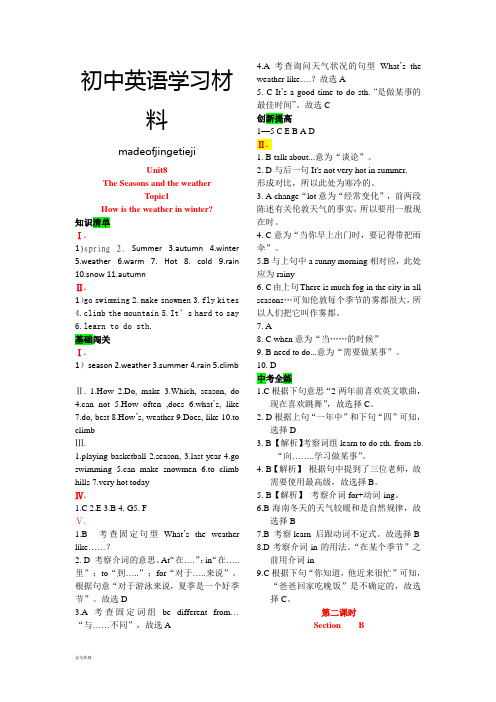U8T1仁爱版七年级英语下册
- 格式:ppt
- 大小:148.50 KB
- 文档页数:2


Unit8 Topic1 教材知识详解1. What’s the weather like in spring? 春天天气怎么样?上面这个句子也可以这样说:How is the weather in spring?(1) 询问天气的句型有两种:What’s the weather like …?How is the weather …?【注意】单说“天气〞时通常加the,但与形容词连用时那么不用冠词。
如:We had nice weather all day yesterday. 昨天我们这里天气一直都很好。
(2) in spring意为“在春天〞,在某个季节前用介词in。
如:in summer/fall/winter 在夏天/秋天/冬天【注意】表示季节、日期、星期和学科名称前不用任何冠词(a/an,the)。
如:一What’s the date today?今天是几月几日?一It’s May 22nd, 2021. 2021年5月22日。
(日期〕We don’t go to school on Sunday.我们星期日不上学。
〔星期〕Mr. Zhang teaches us English this term.张教师这学期教我们英语。
〔学科〕2. Jane, which season do you like best, spring, summer, fall or winter? 简,你最喜欢哪一个季节,春季,夏季,秋季还是冬季?Which season do you like best? 也可以说成What’s your favorite season?此处best是well的最髙级;well的比拟级是better。
如:Which season do you like better, spring or summer? 你比拟喜欢哪一个季节,春季还是夏季?【注意】供选择的并列成分用or连接。

仁爱英语七年级下册u8t1sc知识点仁爱英语七年级下册 Unit 8 Topic 1 Speaking and Listening Skills在学习英语的过程中,口语和听力的能力是非常重要的。
本文主要介绍仁爱英语七年级下册 Unit 8 Topic 1 的口语和听力技巧,帮助学生们提高英语口语和听力能力。
1. 听力技巧在学习英语听力的过程中,有几个技巧可以帮助学生更好地理解英语听力材料:1.1 多听多听英语材料可以帮助学生更好地适应英语语音和语调。
可以听英语歌曲、英语电影、英语广播等,并且听多种口音的英语,如英国英语、美国英语、澳大利亚英语等。
1.2 关注关键词在听英语时,不要拘泥于每个单词,而要关注关键词和短语。
通过听重要的单词和短语,可以更好地抓住听力内容的主题和要点。
1.3 认真听在听英语时,一定要认真听。
不要让自己分心或者在听后直接猜测答案。
仔细聆听,专注于要点,逐渐提高自己的英语听力能力。
2. 口语技巧英语口语是学习英语的基础。
以下是几个帮助学生提高英语口语的技巧:2.1 多练习学习英语口语时,多联系和使用英语。
可以跟同班同学、外教、英语角的人交流,也可以自己练习。
练习可以帮助学生积累口语经验,提升自己的口语能力。
2.2 学会表达自己的想法在英语口语中,需要发表自己的观点和思想。
要学会表达自己的想法,利用所学词汇和语法结构,进行正确的句子构造和口头表达。
2.3 提高发音和语调在学习英语口语时,还需要注意语音和语调的准确性。
要注意单词和句子的重音,并尝试模仿地道英语的语音和语调,提高自己的英语口语表达能力。
总之,英语口语和听力技巧是英语学习的重要组成部分。
通过练习和使用,学生可以逐渐提高自己的口语能力和听力能力,更好地掌握英语这门语言。


仁爱英语七年级下册u8t1Unit 8 Topic 1: In a café。
In this topic, we will learn how to order food and drinks in a café. We will also learn some common phrases and vocabulary related to eating out. By the end of this topic, you will be able to confidently communicate in a café setting.Firstly, let's start with some basic phrases that you can use when entering a café. When you enter a café, you can say "Hello" or "Hi" to the staff. You can also ask for a table by saying "Can I have a table for two, please?" or "Could we get a table near the window?". Remember to use polite language when talking to the staff.After being seated, the next step is to order your food and drinks. You can use phrases like "I would like..." or "Can I have..." to make your order. For example, you can say "I would like a cappuccino, please" or "Can I have a cheeseburger and fries?". Ifyou're not sure about the menu, you can ask the staff for recommendations by saying "What do you recommend?" or "What's your specialty?". They will be happy to assist you.It's also important to know how to ask for the bill when you're finished. You can say "Could we have the bill, please?" or "Can I pay, please?". The staff will bring you the bill, and you can check it to make sure everything is correct. If you're paying with cash, you can say "Here's the exact amount" or "Keep the change". If you're paying with a card, you can say "I'll pay by card, please" or "Do you accept credit cards?".In addition to ordering food and drinks, it's useful to know some vocabulary related to eating out. For example, you can learn words like "menu", "waiter", "chef", "table", "napkin", and "tip". These words will help you understand and communicate better in a café or restaurant setting.To practice what you've learned, you can role-play with a friend. One of you can play the role of the customer, while the other plays the role of the waiter or waitress.Take turns ordering food and drinks, asking for the bill, and using the vocabulary you've learned. This will help you become more confident in real-life situations.In conclusion, learning how to order food and drinks in a café is an important skill. By using the phrases and vocabulary we've discussed, you will be able to communicate effectively in a café setting. Remember to be polite and use proper manners when interacting with the staff. Practice role-playing with a friend to improve your skills. Enjoy your time in the café and have a great dining experience!。

初中英语学习材料madeofjingetiejiUnit8The Seasons and the weatherTopic1How is the weather in winter?知识清单Ⅰ.1)spring 2.Summer 3.autumn 4.winter 5.weather 6.warm 7. Hot 8. cold 9.rain 10.snow 11.autumnⅡ.1)go swimming 2.make snowmen 3.fly kites 4.climb the mountain 5.It’s hard to say 6.learn to do sth.基础闯关Ⅰ.1)season 2.weather 3.summer 4.rain 5.climbⅡ. 1.How 2.Do, make 3.Which, season, do 4.can not 5.How often ,does 6.what’s, like 7.do, best 8.How’s, weather 9.Does, like 10.to climbⅢ.1.playing basketball2.season,st year4.go swimming5.can make snowmen6.to climb hills7.very hot todayⅣ.1.C2.E3.B4. G5. FⅤ.1.B 考查固定句型What’s the weather like……?2. D 考察介词的意思。
At“在….”;in“在…..里”;to“到…..”;for“对于…..来说”。
根据句意“对于游泳来说,夏季是一个好季节”。
故选D3.A考查固定词组be different from…“与……不同”,故选A4.A 考查询问天气状况的句型What’s the weather like….?故选A5. C It’s a good time to do sth. “是做某事的最佳时间”。
Unit 8 Topic 1一、重点词汇:1.weather n. 天气;2.spring n.春天,春季;泉,泉水;3.season n. 季,季节1.rain v.下雨; n.雨,雨水 5. foggy adj. 多雾的;6.snowy adj. 下雪的,多雪的;1.rainy adj. 下雨的,多雨的; 8. windy adj. 有风的,风大的 9. bright adj. 明亮的,聪明的;10. temperature n. 温度; 11. wear (过去式wore) v.穿,戴 12. remember v.记起,想起;13. shine (过去式shone)v. 照耀,发光 14. suddenly adv. 突然,忽然,猛地;15. arrive v.到达;达到;16. harvest n.收割,收获(物)v. 收割;17.leaf(pl.leaves)n. (树,菜) 叶二、重点词组:1. a good season (time) for doing sth/to do sth. ……的好季节(好时间)。
for后跟名词或动词的-ing形式(动名词)to 后跟动词的原形。
例如:Fall is a good season for climbing mountains. 秋天是爬山的好季节。
It’s a good time to have a walk after supper.晚饭后是散步的好时间。
2.had better (not) do sth. 最好(不要)做某事。
它没有时态,语态的变化,只有一种形式,后面要跟动词原形。
例如:W e’d better leave now or we’ll late for school. 我们最好现在就走,不然就要上学迟到了。
You’d better not tell him.你最好不要告诉他。
3.need to take an umbrella. 需要带一把伞。
=____________________________________?春天天气怎么样?2._____________________________________.=______________________________________.______________________________________.=______________________________________.去做某事的好季节/好时间。
3.____________________________________________?= ____________________________________________?你最喜欢哪个季节?4._____________________________________?为什么你最喜欢秋天?5.________________________________.这很难说。
6.____________________________________________.我以前喜欢冬天,但现在我最喜欢夏天。
7.________________________________________.去年我学会了游泳。
________________学会做某事。
8.I don’t like summer very much because it often rains._____________=_____________喜欢做某事。
类似用法还有:begin(开始), start (开始)________________=__________________________________=__________________由上述可以看出:季节前面不加定冠词_________。
it 指代____________。
9.1a 课文-春天的天气怎么样? -天气暖和,是放风筝的好季节。
Unit 8 Topic 1 What's the weather like in Spring?season [ˈsi:zn] n.季,季节spring [sprɪŋ] n.春天,春季;泉,泉水summer ['sʌmə(r)] n.夏天,夏季winter ['wɪntə(r)] n.冬天,冬季weather ['weðə(r)] n.天气warm [wɔ:m] adj.暖和的,温暖的;热情的hot [hɒt] adj.热的;辣的cold [kəʊld] adj.冷的,寒的; n.寒冷;感冒,cloudy ['klaʊdɪ] adj.多云的,阴天的snowy ['snəʊɪ] adj下雪的,多雪的;雪(白)的wind[wɪnd]n.风windy ['wɪndɪ] adj.有风的,多风的rainy ['reɪnɪ] adj.下雨的,多雨的bright [braɪt] adj.明亮的;聪明的sun [sʌn] n.太阳,阳光rain [reɪn] v.下雨; n.雨,雨水snow [snəʊ] v.下雪; n.雪temperature [ˈtemprətʃə(r)] n.温度low [ləʊ] adj.&adv.低;矮suddenly [ˈsʌdənli] adv.突然;忽然;猛地brightly ['braɪtlɪ] adv.明亮地heavily [ˈhevɪli] adv.大量地;重地strongly [strɒŋlɪ] adv.强烈地;浓重地climb 爬,攀登remember [rɪ'membə(r)] v.记起,想起travel [ˈtrævl] v.&n.旅行wear [weə(r)] (过去式wore)v.穿,戴shine [ʃaɪn] (过去式shone)v.照耀,发光harvest ['hɑ:vɪst] n.收割;收获(物); v.收割hope [həʊp] v.&n.希望holiday ['hɒlədeɪ] n.假日,假期umbrella [ʌmˈbrelə] n.伞,雨伞sunglasses [ˈsʌnglɑ:sɪz] n.太阳眼镜,墨镜shorts [ʃɔ:ts] n.短裤;运动短裤hatAustralia [ɒ'streɪlɪə] n.澳大利亚most [məʊst] adj.大部分的;大多数的;adv.最;busy ['bɪzɪ] adj.忙(碌)的1eaf(pl.leaves) n.(树;菜)叶,叶子ourselves [ɑ:ˈselvz] pron.我们自己trip [trɪp] n.旅行,旅程noonoutside一短语1.in spring/ summer在春天/夏天,2.climb hills 爬山,3.learn to do sth.学会去做某事4. remember to do sth 记得要去做5.put on 穿上6.go outside 外出7. had better do sth. 最好做某事8..plan to do sth. 计划去做某事9.know about 了解关于某事10. need to do sth. 需要去做某事11. right away = at once 立刻马上12. later on 过会,很快13. come back to life 复活, 复苏;14. be busy doing sth = be busy with sth 忙于做15.get fine 变好,转晴16.get warm (天气)变暖和17. fall from…从…摔落,跌落18.turn green(树叶)变绿19. last from…to… 从…持续到…20. come out开放,出版e after 紧跟,继…之后到来22Beijing Opera京剧23.take a walk= go for a walk散步二词形转换1. 名词变形容词 cloud- cloudy, snow- snowy, rain- rainy, wind- windy, fog- foggy, sun- sunny.2.形容词变副词: strong – strongly bright-brightly, heavy-heavily happy- happily(blow==strongly shine==brightly snow/ rain==heavily)3. 温度表达: 18℃ eighteen degrees centigrade // eighteen degrees Selsius-5℃ minus five degrees centigrade // minus five degrees Selsius三句型1. What’s the weather like (in spring)? = How is the weather ? 春天天气怎样?2. Which season do you like best, spring, summer, fall or winter? 你最喜欢哪个季节Which season do you like best?=What’s your favorite season?3. I like spring best// My favorite ( season ) is spring.我最喜欢的季节是春天。